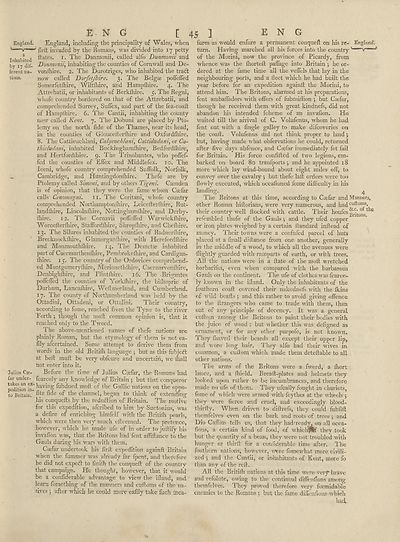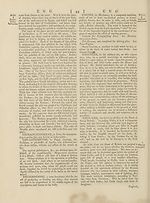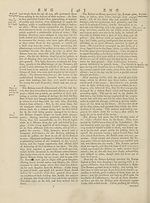Encyclopaedia Britannica, or, a Dictionary of arts, sciences, and miscellaneous literature : enlarged and improved. Illustrated with nearly six hundred engravings > Volume 8, ELE-FOR
(57) Page 45
Download files
Complete book:
Individual page:
Thumbnail gallery: Grid view | List view

E- N G
England. England, including the principality of Wales, when
“ ' fir ft invaded by the Romans, was divided into 17 petty
Inhabited hates, x. The Danmonii, called alfo Dunmonii and
by 17 dif- Donmonii, inhabiting the counties of Cornwall and De¬
ferent na- vonfhire. 2. The Durotriges, who inhabited the tracl
lions. now called Dorfetjhire. 3. The Belgaj pofleffed
Somerfetlhire, Wiltftiire, and Hamplhire. 4. The
Attrebatii, or inhabitants of Berklhire. 5. The Regni,
whofe country bordered on that of the Attrebatii, and
comprehended Surrey, Suflex, and part of the fea-coaft
of Hampfhire. 6. The Cantii, inhabiting the county
now called Kent. 7. The Dobuni are placed by Pto¬
lemy on the north fide of the Thames, near its head,
in the counties of Gloucelterfhire and Oxfordfhire.
8. The Cattieuchlani, Calyeuchlani, Cattidudnni, or Ca-
thicludaniy inhabited Buckinghamlhire, Bedfordfhire,
and Hertfordlhire. 9. The Trinobantes, who poflef¬
fed the counties of Eflex and Middlefex. 10. The
Iceni, whofe country comprehended Suffolk, Norfolk,
^ Cambridge, and Huntingdonlhire. Thefe are by
Ptolemy called Simcni, and by others Tigeni. Camden
is of opinion, that they were the fame whom Ceefar
calls Cenomagni. 11. The Coritani, whofe country
comprehended Northamptonfhire, Leicefterfhire, Rut¬
landshire, Lincolnfhire, Nottingham {hire, and Derby-
ftiire. 12. The Cornavii poflefled Warwickfhire,
Worcefterfhire, Staffordfliire, Shroplhire, and Chefhire.
13. The Silures inhabited the counties of Radnorfhire,
Brecknockfliire, Glamorganihire, with Herefordlhire
and Monmouthlhire. 14. The Demetae inhabited
part of Caermarthenlhire, Pembrokelhire, and Cardigan-
Ihire. 15. Tlie country of the Ordovices comprehend¬
ed Montgomcryfiiire, Merionethfhire, Caernarvonfliire,
Denbighthire, and Flintlhire. 16. The -Brigantes
poflefled tlie counties of Yorkfhire, the bifliopric of
Durham, Lancafliire, Weftmorland, and Cumberland.
17. The county of Northumberland was held by the
Ottadini, Ottadeni, or Ottalini. Their country,
according to fome, reached from the Tyne to the river
Forth •, though the moft common opinion is, that it
reached only to the Tweed.
The above-mentioned names of thefe nations are
plainly Roman, but the etymology of them is not ea-
fily afeertained. Some attempt to derive them from
words in the old Britifh language ; but as this fubjeft
at belt muft be very obfeure and uncertain, we fliall
not enter into it.
Julius Cse- Before the time of Julius Ccefar, the Romans had
far under- fcareely any knowledge of Britain 5 but that conqueror
pedition in- ^av‘n.? ^bdued moft of the Gallic nations on the oppo-
to Britain. ^te ^e channel, began to think of extending
his conquefts by the reduction of Britain. The motive
for this expedition, aferibed to him by Suetonius, was
a defire of enriching himfelf with the Britifh pearls,
which ivere then very much efteemed. The pretence,
however, Avhich he made ufe of in order to jollify his
invafion rvas, that the Britons had fent afliftance to the
Gauls during his wars with them.
Crnfar undertook his firft expedition againft Britain
when the fummer Avas already far fpent, and therefore
he did not expedl to finilh the conqueft of the country
that campaign. He thought, hoAvever, that it avouIcI
be a confiderable adr'antage to vieAV the ifland, and
learn fomething of the manners and cuftoms of the na¬
tives 5 after ivhich he could more eafily take fuch mea-
E N G
fures as Avould enfure a permanent conquefi: on his re- Enghna,
turn. Having marched all his forces into the country '
of the Morini, noAV the province of Picardy, from
Avhence Avas the Ihorteft paflage into Britain j he or¬
dered at the fame time all the veflels that lay in the
neighbouring ports, and a fleet which lie had built the
year before for an expedition againft the Morini, to
attend him. The Britons, alarmed at his preparations,
fent ambafladors Avith offers of fubmiflion j but Ccefar,
though he received them Avith great kindnefs, did not
abandon his intended fcheme of an invafion. He
Avaited till the arrival of C. Volufenus, Avhom he had
fent out Avith a fingle galley to make difeoveries on
the coaft. Volufenus did not think proper to land ;
but, having made AA'hat obfervations lie could, returned
after five days abfence, and Csefar immediately fet fail
for Britain. His force confifted of tAVo legions, em¬
barked on board 80 tranfports ; and he appointed 18
more Avhich lay Avind-bound about eight miles off, to
convey over the cavalry •, but thefe laft orders Avere too
floAvly executed, Avhich occafioned fome difficulty in his
landing. 4
The Britons at this time, according to Cix-far and Manners,
other Roman hiftorians, Avere very numerous, and had cuftony,
their country A\rell ftocked A\7ith cattle. Their houfes^j.^1 e
refembled thofe of the Gauls 5 and they ufed copper
or iron plates Aveighed by a certain ftandard inftead of
money. Their toAATns were a confufed parcel of huts
placed at a fmall diftance from one another, generally
in the middle of a Avood, to Avhich all the avenues Avere
flightly guarded Avith ramparts of earth, or Avith trees.
All the nations Avere in a ftate of the moft wretched
barbarifm, even when compared Avith the barbarous
Gauls on the continent. The ufe of clothes xvas fcarce-
ly knoAvn in the ifland. Only the inhabitants of the
fouthern coaft covered their nakednefs Avith the fkins
of Avild bcafts 5 and this rather to avoid giving offence
to the ttrangers Avho came to trade Avith them, than
out ox any principle of decency. It was a general
cuftqm among the Britons to paint their bodies Avith
the juice of Avoad : but Avhether this Avas defigned as
ornament, or for any other purpofe, is not knoA\m.
They ihavccl their beards all except their upper lip,
and Avore long hair. They alfo had their Avives in
common, a cuftom Avhich made them deteftable to all
other nations.
The arms of the Britons Avere a fword, a flrort
lance, and a Afield. Breaft-plates and helmets they
looked upon rather to be incumbrances, and therefore
made no ufe of them. They ufually fought in chariots,
fome of Avhich Arere armed Avith feythes at the avheels j
they Avere fierce and cruel, and exceedingly blood-
thirfty. When driven to diftrefs, they could fubfift
themfelves even on the bark and roots of trees 5 and
Dio Caflius tells us, that they had-ready, on all occa-
fions, a certain kind of food, of Avhichftf they took
but the quantity of a bean, they Avere not troubled Avith
hunger or third: for a confiderable time after. The
fouthern nations, hoAvever, AVere fomeAvhat more civili¬
zed 5 and the Cantii, or inhabitants of Kent, more fo
than any of the reft.
All the Britilh nations at this time xvere very brave
and refolute, oAving to the continual diffenfions among
themfelves. They proved therefore very formidable
enemies to the Romans 5 but the fame diflenfions Avhieh
had
[ 45 1
England. England, including the principality of Wales, when
“ ' fir ft invaded by the Romans, was divided into 17 petty
Inhabited hates, x. The Danmonii, called alfo Dunmonii and
by 17 dif- Donmonii, inhabiting the counties of Cornwall and De¬
ferent na- vonfhire. 2. The Durotriges, who inhabited the tracl
lions. now called Dorfetjhire. 3. The Belgaj pofleffed
Somerfetlhire, Wiltftiire, and Hamplhire. 4. The
Attrebatii, or inhabitants of Berklhire. 5. The Regni,
whofe country bordered on that of the Attrebatii, and
comprehended Surrey, Suflex, and part of the fea-coaft
of Hampfhire. 6. The Cantii, inhabiting the county
now called Kent. 7. The Dobuni are placed by Pto¬
lemy on the north fide of the Thames, near its head,
in the counties of Gloucelterfhire and Oxfordfhire.
8. The Cattieuchlani, Calyeuchlani, Cattidudnni, or Ca-
thicludaniy inhabited Buckinghamlhire, Bedfordfhire,
and Hertfordlhire. 9. The Trinobantes, who poflef¬
fed the counties of Eflex and Middlefex. 10. The
Iceni, whofe country comprehended Suffolk, Norfolk,
^ Cambridge, and Huntingdonlhire. Thefe are by
Ptolemy called Simcni, and by others Tigeni. Camden
is of opinion, that they were the fame whom Ceefar
calls Cenomagni. 11. The Coritani, whofe country
comprehended Northamptonfhire, Leicefterfhire, Rut¬
landshire, Lincolnfhire, Nottingham {hire, and Derby-
ftiire. 12. The Cornavii poflefled Warwickfhire,
Worcefterfhire, Staffordfliire, Shroplhire, and Chefhire.
13. The Silures inhabited the counties of Radnorfhire,
Brecknockfliire, Glamorganihire, with Herefordlhire
and Monmouthlhire. 14. The Demetae inhabited
part of Caermarthenlhire, Pembrokelhire, and Cardigan-
Ihire. 15. Tlie country of the Ordovices comprehend¬
ed Montgomcryfiiire, Merionethfhire, Caernarvonfliire,
Denbighthire, and Flintlhire. 16. The -Brigantes
poflefled tlie counties of Yorkfhire, the bifliopric of
Durham, Lancafliire, Weftmorland, and Cumberland.
17. The county of Northumberland was held by the
Ottadini, Ottadeni, or Ottalini. Their country,
according to fome, reached from the Tyne to the river
Forth •, though the moft common opinion is, that it
reached only to the Tweed.
The above-mentioned names of thefe nations are
plainly Roman, but the etymology of them is not ea-
fily afeertained. Some attempt to derive them from
words in the old Britifh language ; but as this fubjeft
at belt muft be very obfeure and uncertain, we fliall
not enter into it.
Julius Cse- Before the time of Julius Ccefar, the Romans had
far under- fcareely any knowledge of Britain 5 but that conqueror
pedition in- ^av‘n.? ^bdued moft of the Gallic nations on the oppo-
to Britain. ^te ^e channel, began to think of extending
his conquefts by the reduction of Britain. The motive
for this expedition, aferibed to him by Suetonius, was
a defire of enriching himfelf with the Britifh pearls,
which ivere then very much efteemed. The pretence,
however, Avhich he made ufe of in order to jollify his
invafion rvas, that the Britons had fent afliftance to the
Gauls during his wars with them.
Crnfar undertook his firft expedition againft Britain
when the fummer Avas already far fpent, and therefore
he did not expedl to finilh the conqueft of the country
that campaign. He thought, hoAvever, that it avouIcI
be a confiderable adr'antage to vieAV the ifland, and
learn fomething of the manners and cuftoms of the na¬
tives 5 after ivhich he could more eafily take fuch mea-
E N G
fures as Avould enfure a permanent conquefi: on his re- Enghna,
turn. Having marched all his forces into the country '
of the Morini, noAV the province of Picardy, from
Avhence Avas the Ihorteft paflage into Britain j he or¬
dered at the fame time all the veflels that lay in the
neighbouring ports, and a fleet which lie had built the
year before for an expedition againft the Morini, to
attend him. The Britons, alarmed at his preparations,
fent ambafladors Avith offers of fubmiflion j but Ccefar,
though he received them Avith great kindnefs, did not
abandon his intended fcheme of an invafion. He
Avaited till the arrival of C. Volufenus, Avhom he had
fent out Avith a fingle galley to make difeoveries on
the coaft. Volufenus did not think proper to land ;
but, having made AA'hat obfervations lie could, returned
after five days abfence, and Csefar immediately fet fail
for Britain. His force confifted of tAVo legions, em¬
barked on board 80 tranfports ; and he appointed 18
more Avhich lay Avind-bound about eight miles off, to
convey over the cavalry •, but thefe laft orders Avere too
floAvly executed, Avhich occafioned fome difficulty in his
landing. 4
The Britons at this time, according to Cix-far and Manners,
other Roman hiftorians, Avere very numerous, and had cuftony,
their country A\rell ftocked A\7ith cattle. Their houfes^j.^1 e
refembled thofe of the Gauls 5 and they ufed copper
or iron plates Aveighed by a certain ftandard inftead of
money. Their toAATns were a confufed parcel of huts
placed at a fmall diftance from one another, generally
in the middle of a Avood, to Avhich all the avenues Avere
flightly guarded Avith ramparts of earth, or Avith trees.
All the nations Avere in a ftate of the moft wretched
barbarifm, even when compared Avith the barbarous
Gauls on the continent. The ufe of clothes xvas fcarce-
ly knoAvn in the ifland. Only the inhabitants of the
fouthern coaft covered their nakednefs Avith the fkins
of Avild bcafts 5 and this rather to avoid giving offence
to the ttrangers Avho came to trade Avith them, than
out ox any principle of decency. It was a general
cuftqm among the Britons to paint their bodies Avith
the juice of Avoad : but Avhether this Avas defigned as
ornament, or for any other purpofe, is not knoA\m.
They ihavccl their beards all except their upper lip,
and Avore long hair. They alfo had their Avives in
common, a cuftom Avhich made them deteftable to all
other nations.
The arms of the Britons Avere a fword, a flrort
lance, and a Afield. Breaft-plates and helmets they
looked upon rather to be incumbrances, and therefore
made no ufe of them. They ufually fought in chariots,
fome of Avhich Arere armed Avith feythes at the avheels j
they Avere fierce and cruel, and exceedingly blood-
thirfty. When driven to diftrefs, they could fubfift
themfelves even on the bark and roots of trees 5 and
Dio Caflius tells us, that they had-ready, on all occa-
fions, a certain kind of food, of Avhichftf they took
but the quantity of a bean, they Avere not troubled Avith
hunger or third: for a confiderable time after. The
fouthern nations, hoAvever, AVere fomeAvhat more civili¬
zed 5 and the Cantii, or inhabitants of Kent, more fo
than any of the reft.
All the Britilh nations at this time xvere very brave
and refolute, oAving to the continual diffenfions among
themfelves. They proved therefore very formidable
enemies to the Romans 5 but the fame diflenfions Avhieh
had
[ 45 1
Set display mode to:
![]() Universal Viewer |
Universal Viewer | ![]() Mirador |
Large image | Transcription
Mirador |
Large image | Transcription
Images and transcriptions on this page, including medium image downloads, may be used under the Creative Commons Attribution 4.0 International Licence unless otherwise stated. ![]()
| Permanent URL | https://digital.nls.uk/192264160 |
|---|
| Attribution and copyright: |
|
|---|
| Description | Ten editions of 'Encyclopaedia Britannica', issued from 1768-1903, in 231 volumes. Originally issued in 100 weekly parts (3 volumes) between 1768 and 1771 by publishers: Colin Macfarquhar and Andrew Bell (Edinburgh); editor: William Smellie: engraver: Andrew Bell. Expanded editions in the 19th century featured more volumes and contributions from leading experts in their fields. Managed and published in Edinburgh up to the 9th edition (25 volumes, from 1875-1889); the 10th edition (1902-1903) re-issued the 9th edition, with 11 supplementary volumes. |
|---|---|
| Additional NLS resources: |
|

